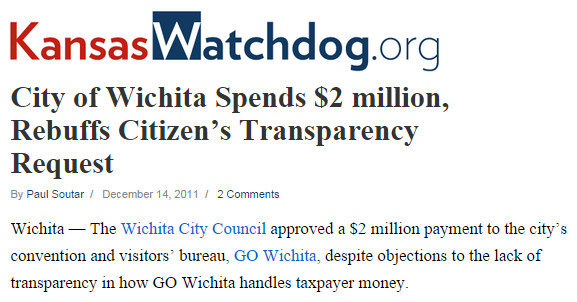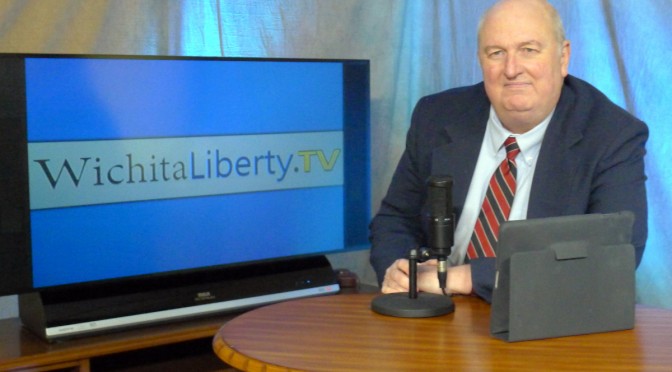Claims of a reformed economic development process if Wichita voters approve a sales tax must be evaluated in light of past practice and the sameness of the people in charge. If these leaders are truly interested in reforming Wichita’s economic development machinery and processes, they could have started years ago using the generous incentives we already have.
At a conference produced by Kansas Policy Institute on Friday September 19, a panel presented the “nuts and bolts” of the jobs portion of the proposed Wichita sales tax that voters will see on their November ballots. I asked a question:
Listening to at least two of the three speakers, it sounds like Wichita’s not been using incentives. Two-and-a-half years ago when Boeing announced it was leaving Wichita, Mayor Brewer angrily produced a document saying since 1980, we’ve given Boeing $658 million in tax forgiveness. Last year the city and the state were somehow able to come up with $84,000 per job for 400 jobs here at NetApp. So we’ve been using a lot of incentives, haven’t we? What are we going to do different now, that hasn’t worked for us, clearly, in the past.
One of the panelists, Paul Allen, provided this answer:
I’m not sure that I agree that it hasn’t worked for us in the past. In fact, Boeing is still one of the largest taxpayers in the city. It has $6 million of real estate taxes paying a year. The Boeing facilities are still paying taxes in this community. Again, the jobs aren’t here, but Boeing on its rebates paid those back, those are on incremental property that it invested that came back on the tax rolls over time, and I think 6 million is the correct number last I looked there is still on the tax rolls in this city. So you have got pay back. And NetApp? NetApp is a win for the city. If you look at the economic models measuring the results of those 400 jobs and the fact that now the NetApp relationship likely to happen on the campus of Wichita State, that’s economic growth. Those are the kinds of jobs you need to attract. What are we going to do differently? We’re going to look at infrastructure more, we’re looking at a more integrated program across the spectrum. WSU is certainly a big part of that program, we’re going to get serious about diversification. We only talk about diversification in the city when the economy is down. We need to be a long-term program for diversification, taking the skills we have and looking at those skills and attracting companies here, helping our companies to expand. We need to invest in our work force, whether it’s at college level or particular to the technical colleges. Again those are the kinds of investments that are going to create a workforce that becomes attractive. It’s just one component, I think if we said it’s one tool in the toolbox. That’s a very important tool. And we are up against communities like Oklahoma City that has $75 million sitting in a fund and believe me that’s a lot more than we’ve invested in the last 10 years. And we will continue to get beaten in the competition if we don’t get more serious about being able to fight for the jobs and you can ask most business owners, particularly manufacturing, they’re called constantly from other communities trying to recruit then out of this community. And that competition is only going to get more intense, in my opinion. So we’ve got to be prepared to wisely invest our money.
(Paul Allen was Chair of Greater Wichita Economic Development Coalition for 2011, and Chair of Wichita Area Chamber of Commerce in 1998. The Wichita Chamber selected him to present the case for the sales tax at this conference.)
Allen’s pushback at the idea that the Boeing incentives were a failure produced a few gasps of astonishment from the audience. I’m sure that if any of Wichita’s elected officials had been in attendance, they would also have been surprised.
 In January 2012, when Boeing announced it was leaving Wichita, people were not happy. Mayor Carl Brewer in a written statement said “The City of Wichita, Sedgwick County and the State of Kansas have invested far too many taxpayer dollars in the past development of the Boeing Company to take this announcement lightly.” Kansas Representative Jim Ward, who at the time was Chair of the South Central Kansas Legislative Delegation, issued this statement regarding Boeing and incentives: “Boeing is the poster child for corporate tax incentives. This company has benefited from property tax incentives, sales tax exemptions, infrastructure investments and other tax breaks at every level of government. These incentives were provided in an effort to retain and create thousands of Kansas jobs. We will be less trusting in the future of corporate promises.” (See Fact-checking Yes Wichita: Boeing incentives)
In January 2012, when Boeing announced it was leaving Wichita, people were not happy. Mayor Carl Brewer in a written statement said “The City of Wichita, Sedgwick County and the State of Kansas have invested far too many taxpayer dollars in the past development of the Boeing Company to take this announcement lightly.” Kansas Representative Jim Ward, who at the time was Chair of the South Central Kansas Legislative Delegation, issued this statement regarding Boeing and incentives: “Boeing is the poster child for corporate tax incentives. This company has benefited from property tax incentives, sales tax exemptions, infrastructure investments and other tax breaks at every level of government. These incentives were provided in an effort to retain and create thousands of Kansas jobs. We will be less trusting in the future of corporate promises.” (See Fact-checking Yes Wichita: Boeing incentives)
But now an icon of Wichita’s business community says that since Boeing is paying $6 million per year in property taxes, it really was a good investment, after all. Today, however, no one is working in these buildings. No productive economic activity is taking place. But, government is collecting property taxes. This counts as an economic development success story, according to the people who support the proposed Wichita sales tax.
 Another important thing to learn from this conference, which is hinted at in Allen’s answer, is that sales tax supporters are not recognizing all the incentives that we have in Wichita. One speaker said “It would be a travesty for you to do nothing.” (He was from out of town, but the Wichita Metro Chamber of Commerce selected him to speak and presented him as an expert.) But as we know from the premise of my question, we have many available incentives, and in large amounts, too.
Another important thing to learn from this conference, which is hinted at in Allen’s answer, is that sales tax supporters are not recognizing all the incentives that we have in Wichita. One speaker said “It would be a travesty for you to do nothing.” (He was from out of town, but the Wichita Metro Chamber of Commerce selected him to speak and presented him as an expert.) But as we know from the premise of my question, we have many available incentives, and in large amounts, too.
Another problem is Allen’s disagreement that what we’ve done has not been working. This is contrary to the evidence the Wichita Chamber has been presenting, which is that we have lost thousands of jobs and are not growing as quickly as peer cities. That is the basis of their case for spending more on economic development.
Allen also spoke of a $75 million fund in Oklahoma City, saying it is much larger that what we’ve invested. I’m sure that Allen is not including all the incentives we’ve used. There were some years, for example, when the value of the abated taxes for Boeing was over $40 million. Last year the city initiated a process whereby NetApp saved $6,880,000 in sales tax, according to Kansas Department of Commerce documents. These tax abatements are more valuable than receiving the equivalent amount as a cash payment, as the company does not pay income taxes on the value of abated taxes.

Second, the people saying these things — promising a new era of economic development in Wichita — are the same people who have been in charge for decades. They’ve been chairs of the Wichita Metro Chamber of Commerce, Greater Wichita Economic Development Coalition, Visioneering Wichita, Wichita Downtown Development Corporation, and Go Wichita Convention and Visitors Bureau. They’re the members of the leadership committee the Chamber formed.
These people are Wichita’s business establishment. They’ve been in charge during the time the Wichita economy has fallen behind. Now, they promise reform. We will do things differently and better, they say. Now, we will prepare to invest wisely, Allen told the audience.
If these leaders are truly interested in reforming Wichita’s economic development machinery and processes, they could have started years ago using the generous incentives we already have.











 The legal stance of the City of Wichita certainly isn’t good public policy. It’s contrary to both the letter and spirit of the
The legal stance of the City of Wichita certainly isn’t good public policy. It’s contrary to both the letter and spirit of the 









